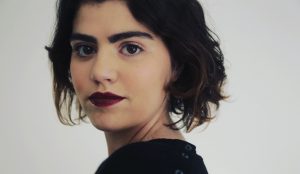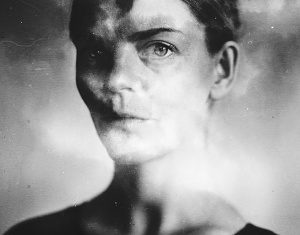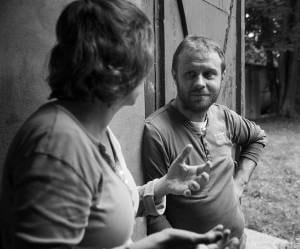Just like the voice was for Grotowski an extension of the reaction and impulses of the entire body, so listening was not with the ears but with the whole body, the whole of oneself.
—Ludwik Flaszen, cofounder of Jerzy Grotowski’s Teatr Laboratorium
Listen up!
Theatre artists from the time of Aeschylus have been exhorting audiences to ratchet up their level of auditory focus as a mechanism for deeper understanding and a route to catharsis. In modern times, few makers or theorists of theatre have placed more emphasis on listening as a transcendent experience than Poland’s Jerzy Grotowski, who, particularly in the later stages of his work, became as obsessed with the inestimable power of song as he was with the body of the actor.

Samantha Shay, a 27-year-old director, actress, and founder of the Portland, Ore.-based collective known as Source Material, is on Grotowski’s wavelength. She’s too young to have actually studied with the controversial master (he died in 1999), but lately Shay has been spending time in serious Grotowski territory: the southwestern Polish city of Wrocław, where the prestigious Grotowski Institute is devoted to keeping his influential ideas alive and kicking.
Shay’s host in Wrocław has been the institute’s director Jarosƚaw Fret, whose groundbreaking work with Teatr ZAR, the company he founded and has led since 2002, has earned him international acclaim. This year Fret is in charge not only of Poland’s annual Theatre Olympics (which is hosting such headliners as Robert Wilson, Tadashi Suzuki, Peter Brook, and Romeo Castellucci, to name a few), but of programming theatre for the flurry of arts-and-culture celebrations marking Wrocław’s designation as European Cultural Capital of 2016. Despite her status as a non-European emerging artist, Shay is on the festival lineup.
Her performance/concert piece A Thousand Tongues, first seen in Portland last year, will officially premiere at the Grotowski Institute’s well-appointed riverside complex in Wrocław Nov. 7-8. The show, echoing the esoteric musical explorations favored by Grotowski and utilized in ZAR’s compelling works, is based on traditional music from Romania, Bulgaria, Kurdistan, Iran, and Greece. Listening, Shay will tell you, is what the show is all about.
“The music is the essence of why live performance is oxygen for us,” she reasons. “It takes theatre back to its roots, to sacredness, ceremony, and ritual.”
Fret’s mentorship of Shay (and his participation as her production’s dramaturg) is not the show’s only connection to ZAR: The Danish actor and singer Nini Julia Bang, who has worked with Fret’s daringly physical ensemble for the past eight years, is A Thousand Tongues’s single performer. Under Shay’s direction, Bang sings original songs in front of a backdrop of changing art pieces to a mixture of Danish, Middle Eastern, and flamenco music. The piece is billed as “a love declaration to the human voice and the fragility of life,” and Bang’s own travels are the music’s source.

“I’ve been able to travel the world and study with incredible, and more or less unknown, masters of different world music,” Bang notes. “I hope that A Thousand Tongues will be a vehicle for sharing some of the things that unite us, as I am singing in 10 different languages, all from different parts of the world with different religious backgrounds.”
Both she and Shay are self-described interdisciplinarians, and they seem to be natural collaborators. Shay grew up in rural Massachusetts, then cut her artistic teeth on the other coast at Cal Arts School of Theatre, where Source Material’s varied ensemble took shape under her leadership. She and Bang met in 2011 after the director was bowled over by her first experience of ZAR’s work, and the two subsequently joined forces on an operatic show called Of Light, much of which was performed (most recently in Reykjavik this past July) in total darkness. The two women are forthright in their admiration for Fret and his longstanding conviction that, as Bang puts it, “Theatre first of all should be heard—it is something we should listen to, before we see it.”
Together in Wrocław in late summer, the three artists talked about their working relationships and the fundamental role of sound in theatre.

Jarosƚaw Fret: Yes, theatre is not just to be seen, even though the Greek word “thea” means “to see” or “to be seen.” But the first thing for me, when you meet a person, is to listen to the person—we are all sounds, or a collection of sounds.
Nini Julia Bang: I believe that the reason Samantha wanted to collaborate with me on A Thousand Tongues was that it is a performance based on sounds, and that her visual ideas and inspirations most often come from sounds.
Samantha Shay: Yes. In all honesty, there are moments when I am directing Nini that I become emotionally overwhelmed—I can’t believe what an extraordinary performer, what a virtuoso, she is, because she gives so much of herself without me doing anything. To direct a solo performance with an artist like that, and in a festival and a space so connected to the lineage of powerful theatre artists, is an incredible honor. Of course, I try not to think about that too much—I just go into the rehearsal room and get lost in the dream world that is the performance.
Bang: Sam and I have an easy, fluent working relationship—we get very inspired by each other’s ideas, and Sam is able to materialize the feelings and sounds and ideas I have in such a natural way. The origin of A Thousand Tongues is the music—most of the songs have been a part of my life for many years. They have lived in me. And through singing them and rearranging them, somehow the images appeared to me, and I would share them with Sam.
Fret: Nina and I also share this way of understanding, because of our years of working together in Teatr ZAR. Theatre’s purpose is not to stop time, because that is impossible, just to condense it in a structural form—again, sound and music are the best ways to structure-ize time. Time becomes a crystal. And we are in it. Through sound as a representation, we can touch something very deep, very important.
Shay: I know that our lives change when our consciousness shifts—that is the place from which the unimaginable can materialize. So I try to bring audiences to a place where they are kind of…destabilized. We have to be anarchists and provocateurs—if we are to create new things, we have to lean back into chaos and not know the answer. I have found that the more I ask myself who created these “rules” we tell ourselves exist, the more we redefine or get rid of definitions altogether, that my work becomes more honest, clear, and potent. It becomes more abstract, and in fact it touches people more deeply.
Jim O’Quinn is the founding editor of this magazine.
*An earlier version of this story misspelled Nini Julia Bang’s first name. It is Nini, not Nina.


